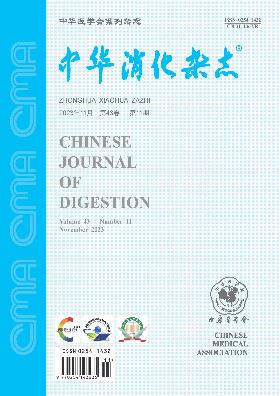Effect of insulin-like growth factor 1 on hepatocyte senescence in carbon tetrachloride-induced liver fibrosis rats
引用次数: 0
Abstract
Objective To investigate the development of hepatocyte senescence during liver fibrogenesis and to explore the effect and possible mechanism of insulin-like growth factor 1 (IGF-1) on hepatocyte senescence and liver fibrosis. Methods A total of 42 male Sprague Dawley (SD) rats were selected. Eighteen rats were induced by carbon tetrachloride (CCl4) to establish the rat model of liver fibrosis. On the day 0, six and 28 after the establishment of the model, six rats were executed respectively to analyze the liver fibrosis and hepatocyte senescence in CCl4-induced liver fibrosis rat models. Twenty-four rats were divided into control group, CCl4 group, CCl4+ lentivirus vector (LV-CTR) group and CCl4+ LV-IGF-1 group, with six rats in each group.The rats were sacrificed on the 28th day after the establishment of the model. The liver tissues were obtained and the inferior vena cava blood was collected to analyze the effect of IGF-1 overexpression on liver fibrosis and hepatocyte senescence. Analysis variance (ANOVA), least significant difference (LSD) and Dunnett T3 test were performed for statistical analysis. Results Steatohepatitis on the 6th day and early stage of hepatic fibrosis on the 28th day, which indicated the model was successfully established. The results of the effects of IGF-1 overexpression on hepatic fibrosis and hepatocyte senescence showed that on the 28th day, compared with those of control group, both the score of Ishak liver inflammation and necrosis and the score of Ishak liver fibrosis were increased in the CCl4 group, CCl4+ LV-CTR group and CCl4+ LV-IGF-1 group (0, 14.55±1.94, 15.43±2.19 and 10.29±1.47, respectively; 0, 3.51±0.51, 3.21±0.79 and 1.32±0.40, respectively). The area of liver tissues by Masson staining (0.45±0.40, 5.62±1.08, 6.03±0.65 and 2.88±1.54), SA-β-Gal staining (1.75±0.80, 4.28±1.19, 4.92±1.14, 3.11±0.79), p53 (2.02±0.81, 4.36±1.02, 4.72±0.72 and 3.58±0.70) and progerin (0.72±0.40, 4.52±1.01, 4.01±1.25 and 2.66±0.80) all were increased. The levels of serum IGF-1 all were decreased ((632.00±6.04), (503.00±40.42), (508.00±21.94) and (572.40±5.94) ng/L). However the levels of ALT all were increased ((11.20±5.97), (214.00±73.90), (245.00±76.06) and (30.00±5.00) U/L). The relative expression levels of p53 (0.58±0.06, 1.78±0.18, 1.72±0.10 and 1.23±0.22) and progerin (0.12±0.02, 0.78±0.15, 1.32±0.20 and 0.81±0.16) in the primary hepatocytes were increased. The differences were all statistically significant (F=91.674, 90.778, 32.982, 9.726, 10.640, 17.029, 103.910, 30.059, 64.707 and 97.457, all P<0.05). Compared with those of CCl4+ LV-CTR group, the score of Ishak liver inflammation and necrosis and the score of Ishak liver fibrosis were decreased in the rats′ liver tissues of CCl4+ LV-IGF-1 group, the areas of Masson staining, SA-β-Gal staining, p53 and progerin in the liver tissues were decreased, the level of serum IGF-1 was increased, the level of ALT was decreased, and the relative expression levels of p53 and progerin in primary hepatocytes both were decreased. The differences were all statistically significant (all P<0.05, respectively). Conclusions Hepatocyte senescence increases in the process of liver fibrosis induced by CCl4. Overexpression of IGF-1 may alleviate liver injury, improve hepatocyte senescence and liver fibrogenesis by regulating the nuclear p53/progerin pathway. Key words: Liver cirrhosis; Insulin-like growth factor 1; Hepatocyte senescence; p53; Rat胰岛素样生长因子1对四氯化碳肝纤维化大鼠肝细胞衰老的影响
目的观察肝纤维化过程中肝细胞衰老的发生过程,探讨胰岛素样生长因子1 (IGF-1)在肝细胞衰老和肝纤维化中的作用及其可能机制。方法选择雄性SD大鼠42只。采用四氯化碳(CCl4)诱导18只大鼠建立肝纤维化模型。在模型建立后第0天、第6天和第28天,分别处死6只大鼠,分析ccl4诱导肝纤维化大鼠模型的肝纤维化和肝细胞衰老情况。将24只大鼠分为对照组、CCl4组、CCl4+慢病毒载体(LV-CTR)组和CCl4+ LV-IGF-1组,每组6只。造模后第28天处死大鼠。取肝组织,取下腔静脉血,分析IGF-1过表达对肝纤维化和肝细胞衰老的影响。采用方差分析(ANOVA)、最小显著性差异(LSD)和Dunnett T3检验进行统计学分析。结果大鼠第6天出现脂肪性肝炎,第28天出现早期肝纤维化,模型建立成功。IGF-1过表达对肝纤维化和肝细胞衰老的影响结果显示,与对照组相比,第28天,CCl4组、CCl4+ LV-CTR组和CCl4+ LV-IGF-1组的Ishak肝炎症坏死评分和Ishak肝纤维化评分分别升高(0、14.55±1.94、15.43±2.19和10.29±1.47);分别为0、3.51±0.51、3.21±0.79、1.32±0.40)。Masson染色(0.45±0.40、5.62±1.08、6.03±0.65、2.88±1.54)、SA-β-Gal染色(1.75±0.80、4.28±1.19、4.92±1.14、3.11±0.79)、p53(2.02±0.81、4.36±1.02、4.72±0.72、3.58±0.70)、progerin(0.72±0.40、4.52±1.01、4.01±1.25、2.66±0.80)的肝组织面积均增加。血清IGF-1水平均降低((632.00±6.04)、(503.00±40.42)、(508.00±21.94)、(572.40±5.94)ng/L)。ALT均升高,分别为(11.20±5.97)、(214.00±73.90)、(245.00±76.06)、(30.00±5.00)U/L。原代肝细胞中p53(0.58±0.06,1.78±0.18,1.72±0.10,1.23±0.22)和progerin(0.12±0.02,0.78±0.15,1.32±0.20,0.81±0.16)的相对表达量升高。差异均有统计学意义(F=91.674、90.778、32.982、9.726、10.640、17.029、103.910、30.059、64.707、97.457,P均<0.05)。与CCl4+ LV-CTR组比较,CCl4+ LV-CTR组大鼠肝组织中Ishak肝炎症坏死评分和Ishak肝纤维化评分降低,Masson染色、SA-β-Gal染色面积降低,肝组织中p53和progerin减少,血清IGF-1水平升高,ALT水平降低,原代肝细胞中p53和progerin的相对表达水平降低。差异均有统计学意义(P<0.05)。结论CCl4诱导肝纤维化过程中肝细胞衰老加快。IGF-1过表达可能通过调节核p53/progerin通路,减轻肝损伤,促进肝细胞衰老和肝纤维化。关键词:肝硬化;胰岛素样生长因子1;肝细胞衰老;p53;老鼠
本文章由计算机程序翻译,如有差异,请以英文原文为准。
求助全文
约1分钟内获得全文
求助全文

 求助内容:
求助内容: 应助结果提醒方式:
应助结果提醒方式:


